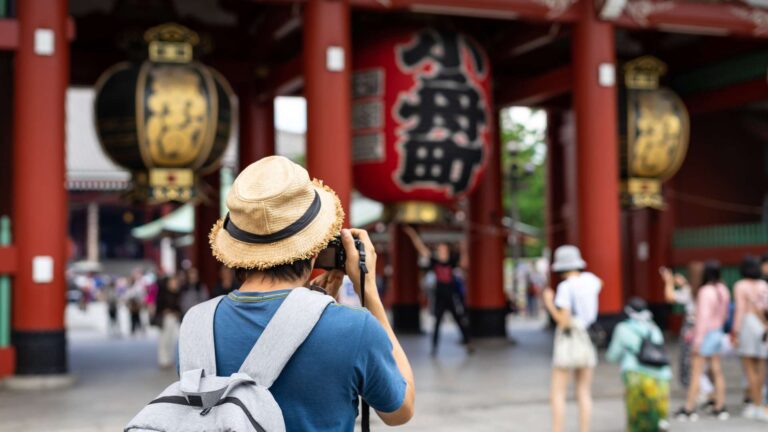Japan is a top travel spot for its culture, views, and food. Its cherry blossoms, ancient temples, and modern cities like Tokyo and Osaka make it appealing. Moreover, Japan’s excellent healthcare and lower costs than most Western countries attract retirees.
Then, the question arises: how much do you need for retirement in Japan? Understanding the costs is vital. As of now, the cost of living in Japan is 38.6% lower than in the US. This includes housing and daily expenses. Japan’s low cost of living helps retirees save money. They can enjoy a good quality of life.
Thinking about moving to Japan? This guide will help. We’ll cover costs, and important factors, and offer tips for a smooth retirement plan.
The Appeal of Retiring in Japan
Japan appeals to retirees not just for its modernity and culture. There are low crime rates, good healthcare, and a long average life. These factors are crucial for those who value safety and health.
Japan’s healthcare is affordable. Yet, retirees must join the National Health Insurance. Private insurance is often necessary for extra costs. Moreover, Japan’s public transport is efficient and its streets, are clean. The country’s parks, markets, and diverse food scene further boost its retirement appeal.
Understanding the Cost of Living in Japan
Japan’s cost of living varies by location and lifestyle. Looking at both Tokyo and Osaka, the average estimation of these areas is highest because of extremely high housing and utility costs. In contrast, smaller cities and rural areas offer much cheaper housing. Recent data shows living costs in Japan are about 38.6% lower than in the US, excluding rent. Thus, japan makes a comfortable way of life more affordable than many other Western countries.
Estimating Monthly and Annual Expenses
For a precise retirement budget in Japan, consider monthly and annual expenses. Housing is a major cost in retirement. This is especially true in cities. In Tokyo, prices are $1,165 and $588 to rent a one-bedroom in the central district or popular suburbs, respectively.
Retirees need to budget for rent, maintenance, and utilities. Smaller homes or suburban living can reduce costs. In Japan, a single person needs $2,700 to $3,500 monthly to retire. However, the exact amount varies by region and lifestyle.
General Guidelines: How Much Should You Save?
The 4% rule suggests retirees can withdraw 4 percent of their accumulated savings every year. In Japan, the retirees need about 32000 to 42000 dollars per year. So, they should aim to save $800,000 to $1 million in cash. This assumes steady investment returns and inflation. However, Japan’s living costs can change due to economic shifts or personal issues.
Factors to Consider When Planning Your Retirement Budget
- Location Preferences
Living costs in Japan vary. Cities like Tokyo and Osaka are pricier than rural areas. Retirees should pick locations that match their budget and lifestyle.
- Seasonal Utilities
Utility bills vary with the seasons. Winter heating and summer cooling are key costs. Planning for these is essential to avoid surprises.
- Transportation Costs
Japan has great public transport, but the costs differ. Rural areas may lack options, making a car necessary. Retirees should consider these costs based on their needs.
Tips for Maximizing Your Retirement Savings
- Use Public Transportation
Japan’s public transit is efficient, clean, and affordable. Using it saves on car costs, allowing more for daily needs and healthcare.
- Minimize lifestyle inflation
Avoid increasing spending after retirement. Stick to a budget and focus on essentials to prevent unnecessary costs. This approach helps savings last and ensures financial stability.
- Limit Dining and Entertainment Costs
Japan’s dining and entertainment can be pricey. Cooking at home and choosing affordable options helps retirees enjoy life without overspending.
Common Mistakes to Avoid When Planning for Retirement in Japan
- Neglecting Tax Planning
US citizens in Japan face dual taxes. Ignoring this leads to penalties. Consulting a tax advisor familiar with both countries’ systems is wise.
- Choosing Expensive Housing
Tokyo and Osaka have high housing costs. This strains budgets. Opting for smaller towns or suburbs saves money while offering good living standards.
- Failing to Plan for Long-Term Residency
Japan doesn’t have a retirement visa. Securing long-term residency needs careful planning. Early research on visa options is crucial.
How Beem Can Help You Plan Your Move
Retirees moving to Japan need a solid financial plan. Beem offers customized services for budgeting, managing currency risks, and boosting savings. Its experts guide clients through overseas retirement challenges, including taxes, healthcare, and investments. By tailoring services to each retiree, Beem ensures a smoother, safer transition to life in Japan.
Conclusion
Retiring in Japan blends tradition, modernity, and lower living costs than many Western countries. Yet, it demands careful financial planning and cost awareness. With the right steps and advice, it’s achievable. So, secure your future today for peace of mind in a captivating country.
Need quick cash, Beem has you covered. Its Everdraft™ feature offers instant cash. There’s no interest, credit check, or hidden fees. So, download Beem and take charge of your finances.
FAQs on How Much You Need to Retire in Japan
1. How much money do you need to retire comfortably in Japan?
On average, for a comfortable lifestyle, Japanese retirees will require approximately 32,000 to 42,000 dollars a year. It covers the cost of living, utility bills, healthcare, food, and various other expenses.
2. What are the average monthly expenses for retirees in Japan?
An average retiree in Japan spends $2,700 to $3,500 a month. Tokyo and Osaka have higher costs. In contrast, smaller cities and rural areas are cheaper. It covers housing, healthcare, food, and transportation.
3. How can I save more effectively for retirement in Japan?
To save effectively, use Japan’s tax-advantaged accounts like iDeCo and NISA, which help grow your retirement funds. Choose affordable living options outside major cities, rely on Japan’s efficient public transportation, and monitor lifestyle spending to prevent inflation.
4. What factors should I consider when planning for retirement in Japan?
When planning, you should consider various factors. It includes the cost of living, Japan’s visa, transportation, utility expenses, etc.
5. Are there any specific retirement savings tips for expats in Japan?
Expats should diversify investments and maximize Japanese tax-beneficial accounts such as NISA and iDeCo. Additionally, keeping currency exchange rates in mind when budgeting is crucial.















































